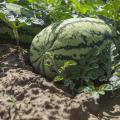Watermelon Cantaloupe and Cucumber
Vine Crops in Mississippi
Watermelons were once grown on more acres than any other vegetable crop in Mississippi. The decline in production is due to three factors: the conservation reserve program has taken many fields out of the production cycle, the invasion of other areas into the market window due to improved varieties and growing techniques, and the cool, wet spring weather has hampered crop establishment for the last several years.
Mississippi is known as a Jubilee type watermelon area, but Allsweet types are being grown more with improved varieties. Watermelons are shipped out of state on a regular basis.
Cantaloupes are grown on 400 to 500 acres in Mississippi, primarily for local sales. Both eastern and western types are grown to meet local demand.
Cucumber production is also done to meet local demand. Both pickling and slicing types are grown.
Frequently Asked Questions
- How do you tell the difference between pickling and slicing cucumbers?
- What is the difference between eastern and western cantaloupe?
- Why are my young watermelon leaves crinkled and pale?
- What plant spacing is recommended for watermelon, cantaloupe or cucumber?
- Can you transplant cucumbers and watermelon?
- Do cantaloupe and cucumber cross?
- How do I control sicklepod in watermelon?
- What is this watermelon seed agreement I have to sign to buy seed?
- Should I trellis cucumbers?
News
RAYMOND, Miss. -- Commercial vegetable growers have a new mobile-based resource to help them manage pests and diseases in their crops. The MyIPM for Vegetables app is the latest in the MyIPM app series. MyIPM for Vegetables currently offers resources for tomatoes and cucurbits, which includes cucumbers, pumpkins, squash and watermelons.
RAYMOND, Miss. -- Harvest is in full swing for Mississippi watermelon producers as rains ramp up, increasing the likelihood of disease and ruined melons.



